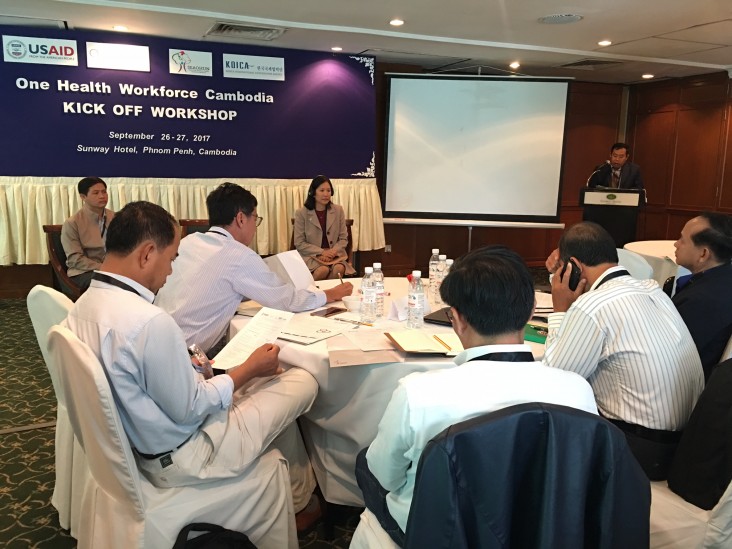
(as prepared for delivery)
- Your Excellency, Professor Eng Huot, Secretary of State for the Ministry of Health
- Your Excellency, Om Kim Sir, Secretary of State for the Ministry of Agriculture, Forestry and Fisheries
- Distinguished Guests, Ladies and Gentlemen
Thank you for gathering here over the next two days to discuss health workforce and training needs and to help formulate an assessment of needs here in Cambodia. I also want to thank the Korea International Cooperation Agency, or KOICA, for the financial support to help make this activity possible.
I’m pleased to see this activity start its 18-month duration with this workshop, where we can kickoff with some practical work.
“One Health Workforce” will allow USAID and its partners to work with universities and ministry officials to strengthen workforce readiness with the ability to respond to emerging infectious disease threats.
As you may be aware, this is one part of a much larger effort called the Global Health Security Agenda (GHSA). The GHSA is a framework that defines eleven different priority areas where countries will focus to improve systems and practices to meet the threshold standards of the International Health Regulations. The idea is that, by doing work in these areas, countries should be better able to prevent avoidable catastrophes, detect threats early, and then respond quickly and effectively when a threat does emerge.
Those 11 priority areas include many tools and systems: improving reporting systems, new biosafety standards, equipping emergency operations centers, and others. But arguably the most important element of a country’s ability to respond is the people; the workforce. USAID is particularly proud of the way this activity will help universities, faculty, students, and ministry officials to prepare Cambodia’s public health and veterinary health professionals to respond better to threats.
The One Health approach recognizes that the health of animals, humans, and the environment are all linked, and for this reason, confronting health threats requires collaboration across sectors. We need to improve our collaborative thinking. We need to reach across different sectors to help professors to teach and to encourage students to learn. We need to strengthen the connections between pre-service and in-service training. If we do these things, we have an exciting opportunity to change how Cambodian health professionals respond to zoonotic disease threats. We have the opportunity to change not only how faculty look at and teach about these disease threats, but to strengthen and improve the professional skills of the next generation of Cambodian health professionals. We have the opportunity to make a difference in Cambodia’s health security and the security of the Southeast Asia region.
It is in the spirit of sharing and collaboration that we have gathered for this workshop. Thank you to our colleagues who have traveled from the United States to work with us. Good luck to everyone who will spend these two days thinking and discussing how One Health can be introduced and better integrated into Cambodia’s training and workforce development.
I look forward to hearing about the achievements of your efforts.
Thank you!
Related Speeches
- Remarks by Polly Dunford, Mission Director, USAID Cambodia, Launch Event of Feed the Future Cambodia Harvest II
- Remarks by Veena Reddy, Deputy Mission Director, USAID Cambodia, EPIC Showcase
- Remarks by Makara Ou, Governance and Rule of Law Team Leader Office of Democracy and Governance, USAID Cambodia, Collaborative Workshop







Comment
Make a general inquiry or suggest an improvement.